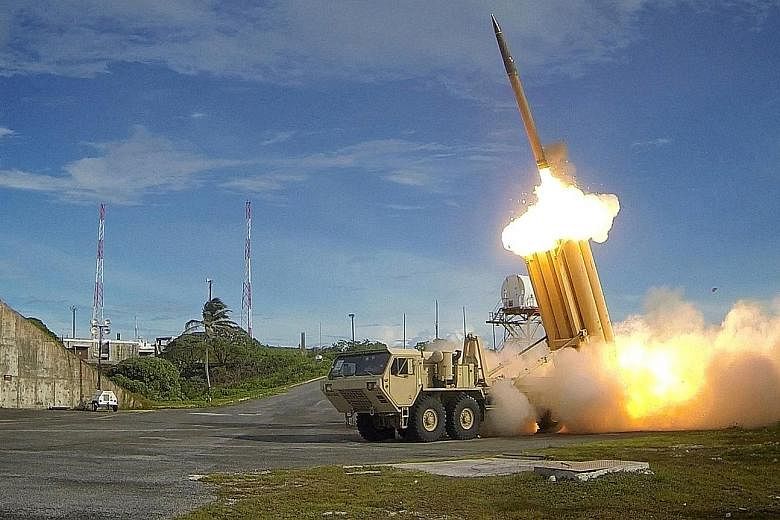WASHINGTON • US Defence Secretary James Mattis will seek to reassure allies worldwide that they can still rely on an increasingly inward-focused United States, as he heads to East Asia on the first overseas trip by a member of President Donald Trump's Cabinet.
The retired Marine Corps general left yesterday for South Korea and Japan - two of the US' closest allies - amid questions about Mr Trump's commitment to the region, having pulled out of a 12-nation Pacific trade deal and suggesting previously that Asian nations were not paying enough for US troops stationed in their countries.
Questions over ties with Tokyo and Seoul come against the backdrop of an increasingly belligerent regime in North Korea. Pyongyang appears to be making preparations for another nuclear or missile test and has been advancing its weapons capability, with Mr Trump saying he would not allow North Korea to threaten US soil.
Officials said Mr Mattis' decision to first head to Asia - as opposed to perhaps visiting troops in Iraq - is meant to reaffirm ties with the two Asian allies which host nearly 80,000 US troops, and the importance of the region overall.
"It is a reassurance message," said one Trump administration official, speaking on condition of anonymity.
"This is for all of the people who were concerned during the campaign that... Trump was sceptical of our alliances and was somehow going to retreat from our traditional leadership role in the region."
Mr Trump himself has spoken with the leaders of Japan and South Korea in recent days and will host Japanese Prime Minister Shinzo Abe in Washington on Feb 10.
Mr Mattis heads first to Seoul before continuing to Tokyo tomorrow.
The trip will reverberate beyond those two key North-east Asian allies, said Mr Patrick Cronin, senior director of the Asia-Pacific Security Programme at the Centre for a New American Security in Washington.
"It is still very important to reassure allies at a time when there is so much uncertainty, turbulence, unpredictability," he said.
Mr Yoichi Kato, a senior research fellow at the Rebuild Japan Initiative Foundation in Tokyo, said that while the Pentagon downplays expectations of any immediate shift in the US military's approach towards the region or in its presence, Mr Trump's style can throw doubt on assurances offered during the visit.
"There is so much (that is) unknown and unpredictable in the Trump administration that it is hard to judge how far comments made by Secretary Mattis will be reflected in Trump's policy," said Mr Kato. "Trust in the US as an alliance partner has already been damaged to some extent, and Mattis' most important job on this trip will be to erase that kind of doubt."
Former deputy defence minister Baek Seung Joo, who is a lawmaker with the ruling Saenuri party, said that by sending Mr Mattis to South Korea first, Mr Trump is delivering a message that the US will preserve its alliance, and sending a warning to Pyongyang.
The trip also sends indirect signals to China that the US stands by a plan approved during the Obama administration to deploy in South Korea an anti-missile system known as the Terminal High Altitude Area Defence, which Beijing opposes, said Mr Baek.
BLOOMBERG, REUTERS

